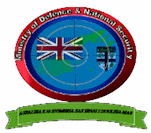Ministry of Defence and National Security (MDNS)
 The core responsibility of the Ministry of Defence and National Security (MDNS) is to manage the nation’s security through the formulation and implementation of policy initiatives, programs and projects on matters of national security and public order, defense, provision of security and intelligence advise, search and rescue operations and coordination of national events.
The core responsibility of the Ministry of Defence and National Security (MDNS) is to manage the nation’s security through the formulation and implementation of policy initiatives, programs and projects on matters of national security and public order, defense, provision of security and intelligence advise, search and rescue operations and coordination of national events.
The formulation of the National Security Strategy (NSS) and the respective White papers for Defence, Police, Immigration, and Intelligence realigns the national security posture to mitigate internal and external threats. The current Government’s National Security Strategy, a first ever of its kind by any Fijian government, reinforces the responsibility of the ‘People’s Security’ in a framework that looks at comprehensive security. This framework capitalises on a whole Government approach that would in turn act as an instrument to achieve life, liberty and pursuit of happiness. So the process of nation building by the Government aims at the unification of the people within the state so that it remains politically stable and viable in the long run.
The Ministry comprises of four Divisions, that is, the Security Forces Division, the National Assessment and Security Division, the Corporate Division which also oversees the Accounts Section and the Research and Development Division.
The major responsibility of Security Forces Division [SFD] is to provide a coordinating role on policy matters that are relevant to the two disciplined forces. In the 2016/2017 Annual Corporate Plan, the strategic priority areas for the division are aligned to the outcomes identified in the National Security Strategy [NSS]. The Division continuously supports the Republic of the Fiji Military Forces and the Fiji Police Force in the implementation of the appropriate mechanisms to ensure that the Ministry’s vision to have a dynamic, professional and effective Ministry is fulfilled.
The Division is also responsible for overseeing compliance to the various international obligations that impact on Search & Rescue, Defence and Law & Order of which Fiji is signatory to. These include AntiPersonnel Land Mines, Biological & Toxin Weapons, Chemical Weapons Conventions, Small Arms & Light Weapons and enabling United Nations Security Council Resolutions that are under the Disarmament affairs and International Convention for the Safety of Life at Sea (SOLAS).
The Security Forces Division is obligated to work with the representatives from the two (2) forces to progress the development of the basic laws and agreements that would assist the Fiji Police and the Republic Fiji Military Forces. These include the Cyber Crime Decree and the Search and Rescue Decree and other Defence and Security Cooperation with strategic development partners.
One of the main policy targets for the National Assessment Division (NAD) in 2014 was the finalization of the National Security and Intelligence Decree and formal setting up of a National Intelligence Agency that would coordinate the Intelligence effort of Government. The paper was presented to the National Security Council at its first seating in January 2014 and a decision was reached that the decree was to be put on hold until an elected Government was in place. No further work was pursued on this in the year, and a final draft of this decree is now with the Solicitor General’s Office. The Division recommenced work on promulgation of this decree through Cabinet and Parliament in 2015.
In 2014, the National Assessment Division was assigned with provision of timely quality intelligence advice to the Prime Minister, the Minister for Defence, National Security and Immigration and the National Security Council. With the aim of getting a complex perspective of ongoing and new security developments within the country, the Division significantly relied on information sharing provided by the Republic of Fiji Military Forces and the Fiji Police Force Intelligence Cells in its daily management and analysis.
|
NEWSLETTER
|
| Join the GlobalSecurity.org mailing list |
|
|
|

